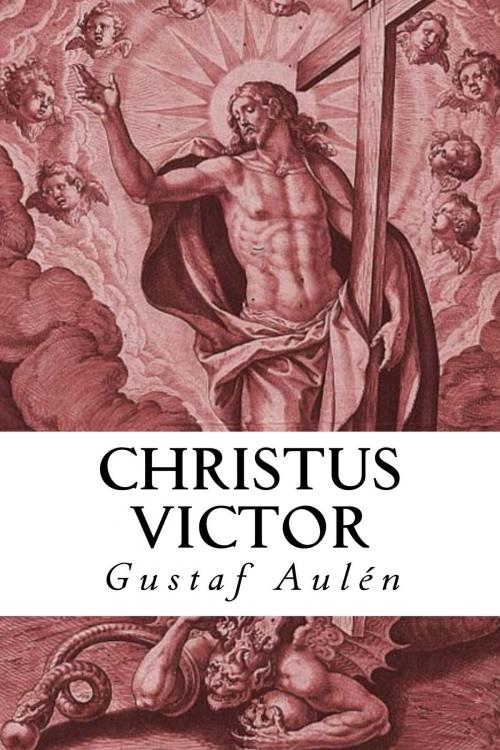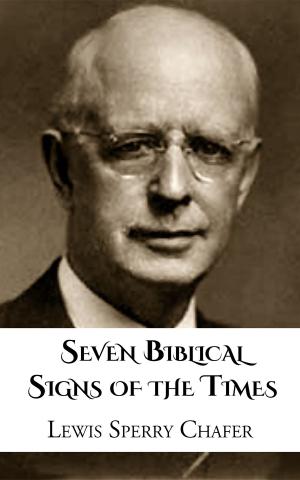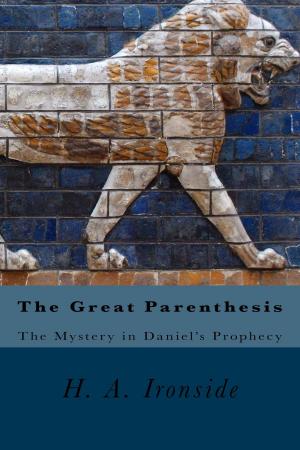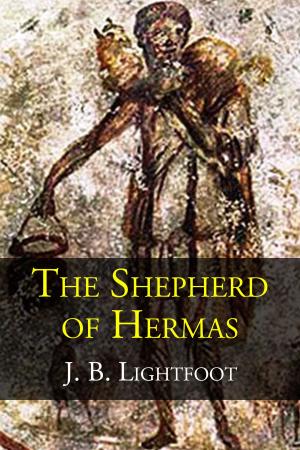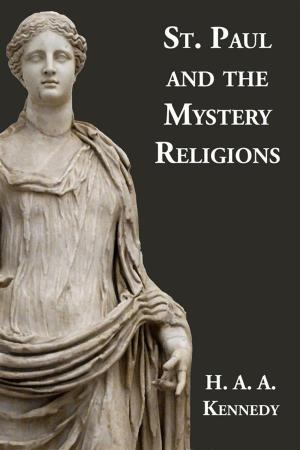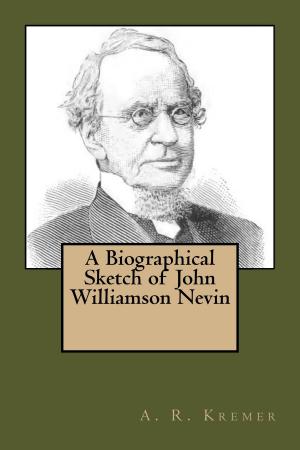Christus Victor
An Historical Study of the Three Main Types of the Atonement
Nonfiction, Religion & Spirituality, Christianity, Church, Church History, General Christianity, Theology| Author: | Gustaf Aulén | ISBN: | 1230001341638 |
| Publisher: | CrossReach Publications | Publication: | September 10, 2016 |
| Imprint: | Language: | English |
| Author: | Gustaf Aulén |
| ISBN: | 1230001341638 |
| Publisher: | CrossReach Publications |
| Publication: | September 10, 2016 |
| Imprint: | |
| Language: | English |
Gustaf Emanuel Hildebrand Aulén (May 15, 1879, Ljungby – December 16, 1977) was the Bishop of Strängnäs in the Church of Sweden, a theologian, and the author of Christus Victor, a work which still exerts considerable influence on contemporary theological thinking on the atonement.
Aulén was born in 1879 in Ljungby parish, Kalmar County, Sweden to Rev. F.J. Aulén and Maria Hildebrand. He married Kristine Björnstad in 1907. After studying at Uppsala University, Aulén became professor of dogmatics at Lund University in 1913, then Bishop of Strängnäs in 1933.
Aulén's first major theological work was 'The Faith of the Christian Church', published in Swedish in 1923. His most famous work - Christus Victor - followed in 1930, with an English translation in 1931. 'The Faith of the Christian Church' was translated into English in 1948. Aulén's work gained international recognition and most of his later works were quickly followed by English translations.
Aulén was also an avid composer, contributing profusely to the Swedish hymnbook. He was the president of the Royal Swedish Academy of Music 1944–1950.
Aulén retired his bishopric in 1952, returning to Lund to devote himself to his academic work. He published an autobiography - "My ninety-six years: happenings and thoughts" - in 1975 and died two years later on December 16, 1977 at the age of 98.
Aulén was a prominent member of the 'Lundensian' school of theology, along with Anders Nygren and Ragnar Bring. The Lundensian school perhaps resembles most closely that of neo-orthodoxy in the German-speaking and English-speaking theological scenes of the mid-20th century, with an emphasis on divine transcendence.
Two significant influences on Aulén's thinking were Martin Luther, whose work Aulén consistently praises, and Friedrich Schleiermacher, of whom Aulén is much more frequently critical.
Aulén's most influential contribution to Theology was in the area of Atonement theory. His book Christus Victor has established itself as one of the key reference points in contemporary discussion.
Aulén identified three main theories of the Atonement: the 'scholastic' view, epitomised by Anselm of Canterbury (known as Satisfaction theory); the 'idealistic' view, epitomised by Peter Abelard (known as Moral Exemplar theory); and what he referred to as the 'classic' view.
Dr. Aulén was Professor of Systematic Theology in the University of Lund, and this book is a translation of the Olaus Petri Lectures delivered by him before the University of Uppsala in March and April, 1930. The same lectures were also delivered in Germany in September, 1930, in a much condensed form, the eight lectures being brought down to three, with the title of Die drei Haupttypen des christlichen Versöhnungsgedankens, and were published in Zeitschrift für systematische Theologie, 1930, pp. 501–538.
This book is strictly an historical study; it contains no personal statement of belief or theory of the Atonement. Its important and original contribution is its strong delineation of the view of the Atonement which is summed up in such phrases as ‘Christus Victor,’ and ‘God was in Christ reconciling the world to Himself’—the view that sets the Incarnation in direct connection with the Atonement, and proclaims that it is God Himself who in Christ has delivered mankind from the power of evil. As soon as the meaning of this view is grasped, the patristic teaching at once stands out as a strong, clear, and consistent whole, and it becomes impossible to doubt that it is this view which also dominates the New Testament; it has therefore every right to be called the typical Christian view, or, in Dr. Aulén’s phrase, the ‘classic’ idea of the Atonement. Evidently, too, it is to be distinguished from the view which grew up in the West on the basis of the forensic idea of sin as transgression of law, and which received its first clear formulation from Anselm; for that view regards the Atonement as not in the full sense God’s work, but rather as the act whereby man in Christ makes reparation for man’s sin. Dr. Aulén proceeds to show that Luther revived the classic idea of the Atonement with mighty power, but that Luther’s successors went back to the forensic view, which thus came to dominate orthodox Protestantism; and that the theologians of the ‘subjective’ or exemplarist view, which arose to challenge the accepted forensic theory, so far from returning to the classic idea, diverged from it still further, and concentrated their whole attention on the psychological process of man’s reformation. Dr. Aulén closes with the hopeful expectation that we shall yet see the classic idea of the Atonement return in its strength; for with all his restraint, he cannot conceal where his own sympathies lie.
Gustaf Emanuel Hildebrand Aulén (May 15, 1879, Ljungby – December 16, 1977) was the Bishop of Strängnäs in the Church of Sweden, a theologian, and the author of Christus Victor, a work which still exerts considerable influence on contemporary theological thinking on the atonement.
Aulén was born in 1879 in Ljungby parish, Kalmar County, Sweden to Rev. F.J. Aulén and Maria Hildebrand. He married Kristine Björnstad in 1907. After studying at Uppsala University, Aulén became professor of dogmatics at Lund University in 1913, then Bishop of Strängnäs in 1933.
Aulén's first major theological work was 'The Faith of the Christian Church', published in Swedish in 1923. His most famous work - Christus Victor - followed in 1930, with an English translation in 1931. 'The Faith of the Christian Church' was translated into English in 1948. Aulén's work gained international recognition and most of his later works were quickly followed by English translations.
Aulén was also an avid composer, contributing profusely to the Swedish hymnbook. He was the president of the Royal Swedish Academy of Music 1944–1950.
Aulén retired his bishopric in 1952, returning to Lund to devote himself to his academic work. He published an autobiography - "My ninety-six years: happenings and thoughts" - in 1975 and died two years later on December 16, 1977 at the age of 98.
Aulén was a prominent member of the 'Lundensian' school of theology, along with Anders Nygren and Ragnar Bring. The Lundensian school perhaps resembles most closely that of neo-orthodoxy in the German-speaking and English-speaking theological scenes of the mid-20th century, with an emphasis on divine transcendence.
Two significant influences on Aulén's thinking were Martin Luther, whose work Aulén consistently praises, and Friedrich Schleiermacher, of whom Aulén is much more frequently critical.
Aulén's most influential contribution to Theology was in the area of Atonement theory. His book Christus Victor has established itself as one of the key reference points in contemporary discussion.
Aulén identified three main theories of the Atonement: the 'scholastic' view, epitomised by Anselm of Canterbury (known as Satisfaction theory); the 'idealistic' view, epitomised by Peter Abelard (known as Moral Exemplar theory); and what he referred to as the 'classic' view.
Dr. Aulén was Professor of Systematic Theology in the University of Lund, and this book is a translation of the Olaus Petri Lectures delivered by him before the University of Uppsala in March and April, 1930. The same lectures were also delivered in Germany in September, 1930, in a much condensed form, the eight lectures being brought down to three, with the title of Die drei Haupttypen des christlichen Versöhnungsgedankens, and were published in Zeitschrift für systematische Theologie, 1930, pp. 501–538.
This book is strictly an historical study; it contains no personal statement of belief or theory of the Atonement. Its important and original contribution is its strong delineation of the view of the Atonement which is summed up in such phrases as ‘Christus Victor,’ and ‘God was in Christ reconciling the world to Himself’—the view that sets the Incarnation in direct connection with the Atonement, and proclaims that it is God Himself who in Christ has delivered mankind from the power of evil. As soon as the meaning of this view is grasped, the patristic teaching at once stands out as a strong, clear, and consistent whole, and it becomes impossible to doubt that it is this view which also dominates the New Testament; it has therefore every right to be called the typical Christian view, or, in Dr. Aulén’s phrase, the ‘classic’ idea of the Atonement. Evidently, too, it is to be distinguished from the view which grew up in the West on the basis of the forensic idea of sin as transgression of law, and which received its first clear formulation from Anselm; for that view regards the Atonement as not in the full sense God’s work, but rather as the act whereby man in Christ makes reparation for man’s sin. Dr. Aulén proceeds to show that Luther revived the classic idea of the Atonement with mighty power, but that Luther’s successors went back to the forensic view, which thus came to dominate orthodox Protestantism; and that the theologians of the ‘subjective’ or exemplarist view, which arose to challenge the accepted forensic theory, so far from returning to the classic idea, diverged from it still further, and concentrated their whole attention on the psychological process of man’s reformation. Dr. Aulén closes with the hopeful expectation that we shall yet see the classic idea of the Atonement return in its strength; for with all his restraint, he cannot conceal where his own sympathies lie.
